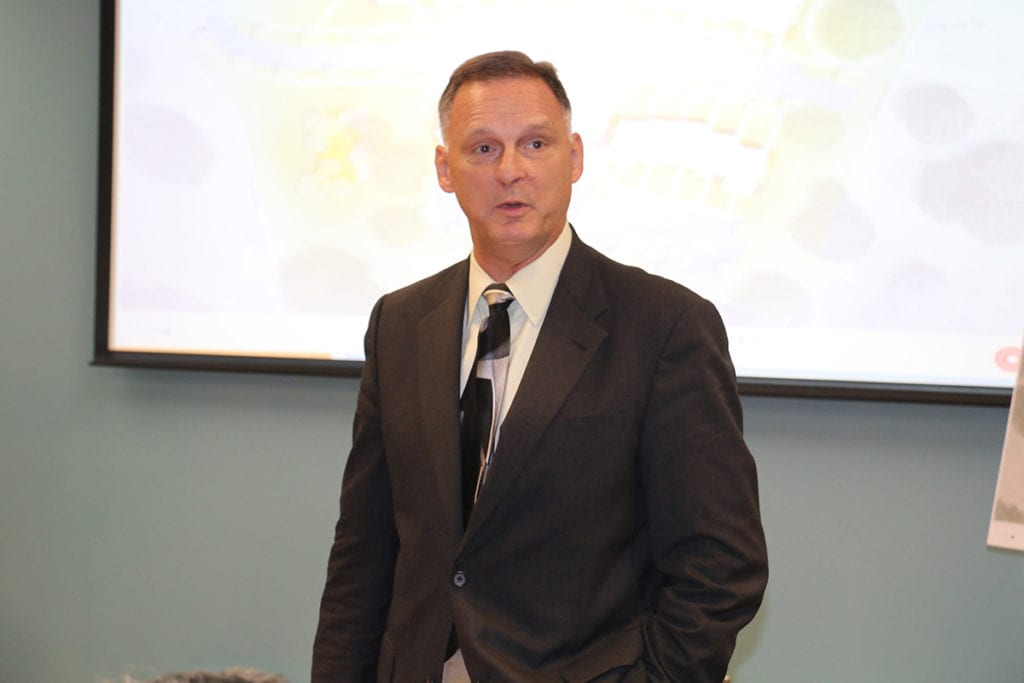By Peter White
NASHVILLE, TN – He’s one of the biggest developers in Nashville and he’s building on some of the priciest real estate in town and doesn’t plan on stopping anytime soon.
He isn’t Bert Mathews or Tony Giarratana. They are small fish compared to Jim Harbison, the Executive Director of Metropolitan Development and Housing Agency (MDHA).
Harbison is the big kahuna when it come to new affordable housing in Nashville. He’s got 11 of 20 public housing properties already converted into a federal program called the Rental Assistance Demonstration (RAD) with nine more to follow by the end of June 2018. He plans on tearing down all 20 of MDHA’s public housing projects and building new mixed income developments in their place.
It is a big gamble and even his detractors say Harbison is being forced to play the only game in town when it comes to housing the poor.
Is he a starry-eyed idealist, a utopian urban visionary who wants to build better housing, create safer neighborhoods, and generate higher incomes for public housing residents?
Or is he a well-intentioned but misguided bureaucrat who will not only demolish every public housing project in the city, but also mortgage the land they sit on? He is doing both those things.
If things go badly in the real estate market, which they did big time in 2008, will the biggest loss of public property in the city’s history happen on his watch? Is he naïve to think you can mix different social classes in an unprecedented experiment that is likely to fail? Only time will tell.
It will be fifteen or twenty years before we know the answer to these questions. In the meantime, like the Pied Piper, Jim Harbison is playing some sweet enchanting music that is hard to resist. Then again, there is no place like the American South to put up a good fight when it comes to resisting change.
Harbison intends to house the well to do in the same buildings with the American underclass and even his friends thinks that is betting the farm on a pretty iffy proposition: can the Grounders and the Sky People be friends? Isn’t it obvious they will never get along?
The son of a West Tennessee sharecropper, Harbison grew up hard. Then he joined the US Army. Like his father who bet the family’s welfare on a good crop one year after the next, Harbison is betting that Congress won’t throw shade on his new housing projects anytime soon. But he’s gambling with the lives of thousands of Nashville’s neediest residents and millions of dollars of public assets.
He is investing them through an Obama Administration program created in 2012 that allows PHAs, in Nashville that is MDHA, to partner with non-profits or for-profit developers to demolish and rebuild affordable housing if the old properties can not be rehabilitated.
The red brick projects in Nashville were built in the 1940s and 1950s. The buildings are solid but the plumbing and electrical wiring are shot.
For many years, the U.S. Congress has not given the U.S. Department of Housing and Urban Development (HUD) enough money to maintain and rehabilitate public housing. Upkeep of those projects is the last thing on HUD’s priority list, so when Barack Obama took office in 2009, he inherited a backlog of $26 billion in deferred maintenance costs. According to the National Housing Law Project that figure has almost doubled since then and is now $49 billion.
Under the Rental Assistance Demonstration Program (RAD) housing agencies can look for investment capital in the private market and fix old projects or build new ones with investment partners who own the new buildings. They sign 15 -20 years leases to provide housing for the poor and when the long-term leases come up for renewal they are automatically renewed. The rent subsidies continue with each contract renewal.
But Jim Harbison isn’t taking on any new partners so he is avoiding ownership and control issues with his new projects. He’s raising money the old fashion way: he’s borrowing it from commercial banks.
When asked what would happen if the loans he is floating now go underwater on property MSHA already owns he said: “That won’t happen because we are good managers.”
And those loans are insured. If MDHA can’t service its debt a HUD insurance program is supposed to pay off the loans. But a lot can happen in 15 years.
Nobody knows if Congress will continue to provide low-income housing subsidies and when it is time to renew the long-term leases HUD may not have the funds to provide vouchers or low income tax credits to MDHA for the housing projects it is building now.
If that happens, and it well might if Republicans continue to control Congress, what has been public housing since the 1940s will become market-rate housing and thousands of Nashville’s neediest residents will be put out on the street.
RAD will turn out to be like King Arthur’s Camelot, a nice dream that did not last and even worse. If RAD fails in Nashville, public housing stock will no longer exist here and the steadily shrinking pool of private owners who accept Section 8 vouchers will be much smaller. In the end, RAD may create a much worse affordable housing crisis in Nashville than it was designed to fix.
But there are things MDHA is doing to make sure that doesn’t happen. Going it alone and not having partners who have an ownership stake in the new housing projects, is a conscious choice Harbison has made to insulate them from ever going private.
Next issue: read about Envision Edgehill and how MDHA is not only remodeling public housing properties but redefining the communities where they exist.



